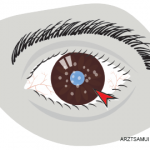NEW YORK (Reuters Health)—Treatment of uveitis with adalimumab is linked with “clinically meaningful” differences in quality of life compared with treatment with placebo, new research shows.
Dr. John Sheppard of Eastern Virginia Medical School in Norfolk, Va., tells Reuters Health, “Regardless of underlying etiology or lack thereof, uveitis can have a profoundly adverse effect upon an individuals’ physical, emotional, work, avocational and social functioning in everyday life.”
“This study utilizes a validated quality of life questionnaire to demonstrate that adalimumab-treated patients with noninfectious uveitis experience significant and functionally meaningful improvements in vision-related quality of life, compared with those who received placebo,” he says.
As reported in JAMA Ophthalmology, online April 20, Dr. Sheppard and colleagues conducted post-hoc analyses of one clinical trial that involved 217 adults (about half women, with mean age 43) with active noninfectious intermediate uveitis, posterior uveitis and panuveitis, and a second trial involving 226 individuals (60% women, with mean age 43) with inactive disease.1
All patients completed the National Eye Institute Vision Function Questionnaire (NEI VFQ-25), which assesses the effect of visual impairment from the patient’s perspective. Scores range from 0–100, with higher scores indicating better vision-related quality of life.
Patients were randomized to an 80 mg subcutaneous loading dose of adalimumab followed by 40 mg adalimumab every other week, or placebo, for 80 weeks.
In the active disease trial, treatment benefit was assessed for the first time at Week 6. Outcomes for this group were changes in the NEI VFQ-25 from the best state achieved prior to week six to the final visit. That change was −1.30 for adalimumab and −5.50 for placebo (P=0.01).
In the inactive disease trial, treatment benefit was assessed as the difference between NEI VFQ-25 scores from the baseline visit to the final (or early termination) visit. The change in that group was 3.36 for adalimumab and 1.24 for placebo (P=0.16).
In both trials, longitudinal analyses showed a significant difference overall in NEI VFQ-25 between adalimumab and placebo of 3.07 (scores of 74.15 vs. 71.08, respectively) for the active disease trial and 4.66 (82.39 vs. 77.73) in the inactive disease trial.
The authors say their findings suggest “that adalimumab is associated with statistically significant and clinically meaningful improvements in patient-reported visual functioning for patients with noninfectious intermediate uveitis, posterior uveitis and panuveitis.”
Editorialist Dr. Bryn Burkholder of Johns Hopkins University School of Medicine in Baltimore, tells Reuters Healt, “[Although] scores on the NEI VFQ-25 may not completely reflect the complex ways in which uveitis can affect a patient’s life, the study … makes a strong argument that treatment with adalimumab can improve vision-related quality of life in some clinically meaningful ways.”2
She concludes, “We need additional studies to give insight into the impact of things like cost of treatment, need for monitoring, and long-term effects of therapy—all of which are important considerations in the treatment of patients with uveitis.”
The study was funded by AbbVie, which markets adalimumab (Humira). Dr. Sheppard has received consulting fees from AbbVie and other companies. Three coauthors are AbbVie employees and own AbbVie stock, and another three have received consulting fees from AbbVie.
References
- Sheppard J, Joshi A, Betts KA, et al. Effect of adalimumab on visual functioning in patients with noninfectious intermediate uveitis, posterior uveitis and panuveitis in the VISUAL-1 and VISUAL-2 trials. JAMA Ophthalmol. 2017 Apr 20. doi: 10.1001/jamaophthalmol.2017.0603. [Epub ahead of print]
- Burkholder BM, Ramulu PY. Improving more than just vision in noninfectious uveitis. JAMA Ophthalmol. 2017 Apr 20. doi: 10.1001/jamaophthalmol.2017.0716. [Epub ahead of print]

